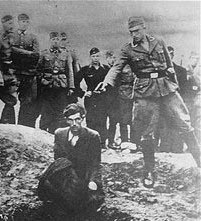
What Does Holocaust Mean?
The Holocaust began in 1933 when Hitler came to power in Germany and ended in 1945 when the Nazis were defeated by the Allied powers.
The term "Holocaust," originally from the Greek word "holokauston" which means "sacrifice by fire," refers to the Nazi's persecution and planned slaughter of the Jewish
people. The Hebrew word "Shoah," which means "devastation, ruin, or waste," is also used for this genocide.
In addition to Jews, the Nazis targeted Gypsies, homosexuals, Jehovah's Witnesses, and the disabled for persecution. Anyone who resisted the Nazis was sent to forced labor or murdered.
The term "Nazi" is an acronym for "Nationalsozialistishe Deutsche Arbeiterpartei" ("National Socialist German Worker's Party").
The Nazis used the term "the Final Solution" to refer to their plan to murder the Jewish people.
Ghettos
After the beginning of World War II, Nazis began ordering all Jews to live within certain, very specific, areas of big cities, called ghettos.
Jews were forced out of their homes and moved into smaller apartments, often shared with other families.
Some ghettos started out as "open," which meant that Jews could leave the area during the daytime but often had to be back within the ghetto by a curfew. Later, all ghettos became "closed," which meant that Jews were trapped within the confines of the ghetto and not allowed to leave.
When the Nazis decided to kill the remaining Jews in a ghetto, they would "liquidate" a ghetto by boarding the last Jews in the ghetto on trains.
When the Nazis attempted to liquidate the Warsaw Ghetto on April 13, 1943, the remaining Jews fought back in what has become known as the Warsaw Ghetto Uprising. The Jewish resistance fighters held out against the entire Nazi regime for 28 days, longer than many European countries had been able to withstand Nazi conquest.
Concentration and Extermination Camps
Although many people refer to all Nazi camps as "concentration camps," there were actually a number of different kinds of camps, including concentration camps, extermination camps, labor camps, prisoner-of-war camps, and transit camps.
Jewish customs
Flowers are normally not sent, for the following reasons:
Simplicity. The tradition in Judaism is to keep funerals as
simple as possible, to make everyone equal in death.
Tradition. Although flowers are not prohibited, the custom arose over time of not sending flowers, and making contributions instead. In ancient days, the Talmud informs us, fragrant flowers and spices were used at the funeral to offset the odor of the decaying body. Today, this is no longer essential and thus, many Jews do not use them at Jewish funerals at all. Most feel it is much better to honor the deceased by making a contribution to a synagogue or hospital, or to a medical research association for the disease which afflicted the deceased. This method of tribute is more lasting and meaningful.
Instead of flowers Jews usually put small white rocks.
No comments:
Post a Comment